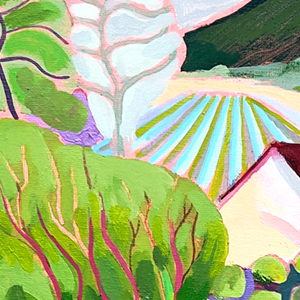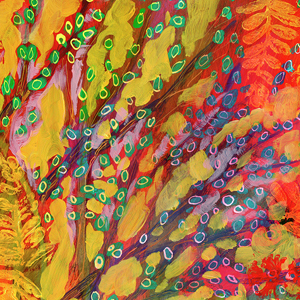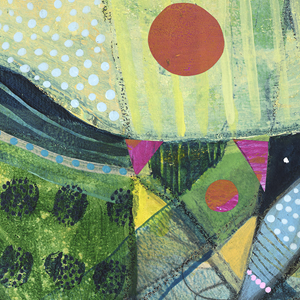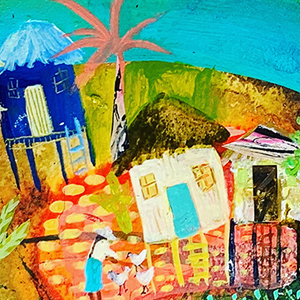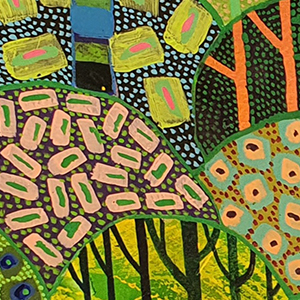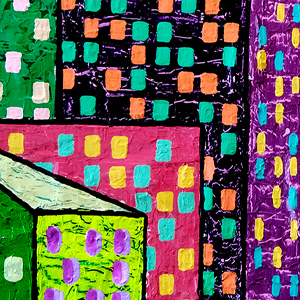
Good Work
The Generosity of Work Worth Loving
Christopher Wong Michaelson
Artwork: “City Windows” by Vlado Vesselinov © 2022
Do What You Love?
Contrary to what a Google search may tell you, Confucius probably never said, “Do what you love, and you’ll never work a day in your life.” Rather, the Confucian work values that my Chinese grandfather passed down to his descendants might be more accurately summarized in the statement, “Do work that’s worth loving every day of your life.”
To be fair, Confucius probably never said that, either. However, it stands up to scrutiny in a way that the contemporary preoccupation with loving your work does not. Getting paid for your passion is often easier said than done, especially in archetypal calling-driven professions like healthcare and the performing arts. Even if you are fortunate enough to find a paid position, doing what you love for money has the potential to make it feel like work, cheapening the experience of doing it for its own sake. Those who work for love are susceptible to self-exploitation in the form of overwork as well as exploitation by employers who feel justified underpaying them. Moreover, if everyone worked at what they wished to, who would clean the toilets, sweep the streets, and do other work that may be unpleasant yet essential to societal functioning?
Over the course of his working life, my grandfather experienced great success and abject failure at work without ever having the luxury to choose work he loved. In our new book, Is Your Work Worth It? How to Think About Meaningful Work,1 my coauthor Jennifer Tosti-Kharas and I open chapter one with his story, which began when he was born to subsistence farmers in the Chinese countryside. He left home as an adolescent to go to school and worked to pay for room and board as a newspaper calligrapher, one of the traditional scholar’s three perfections that he would continue to practice into adulthood. From school, the surest path to social mobility for a peasant was to join the military, where he rose to the rank of general in the Chinese Nationalist Army. Just as he was approaching the pinnacle of his professional success, he suffered a series of losses: his first two children, his first wife—and then, when the Nationalists were defeated by the Chinese Communist Army—his country, his social status, and his wealth. He started over in his adopted country of Brazil, supporting his second wife and eight surviving children as the co-owner of a laundry business. After he and his partner had a falling out, he went on to fail many more times as a businessman until his children took care of him in retirement.
His ostensibly Confucian philosophy of work was that the best work generously shared knowledge and skills to improve others’ lives and the worst work was self-aggrandizing and self-interested. When he proclaimed that government service and other helping professions were the most noble and business among the least, I suspect he was not only channeling his Confucian studies, but also his own experience. He successfully steered two of his sons toward medicine, where they not only looked after the health of their parents, but countless other patients as well. And he pragmatically disregarded Confucian gender norms to see three of his daughters (including my own mother) into education, where they would go on to teach, among other things, Mandarin to Americans, English to Brazilians, and painting to Taiwanese. His children who succeeded in business built lasting relationships with colleagues and customers, challenging his low opinion of business that may have been shaped by unscrupulous competition and economic desperation. Even in retirement, his work included calligraphy, the daily discipline of the martial art taijiquan, and advice to his descendants to do work worth loving whether or not they loved to do it every day.
The Generosity of Work
What makes work worth loving? And is it true that some work, such as the helping professions, is more generous? The original impetus for our book was research with my co-author on how work was depicted in memorials of 9/11 victims. Most scholarship that studies the meaning of work in our lives does so from the perspective of the worker2. One of the novel contributions of our 9/11 research was that we studied the meaning of work from the perspective of close relations—family members, friends, and co-workers whose accounts were then interpreted by journalists who wrote “Portraits of Grief” for the New York Times. Perhaps it is predictable that there were many stories that lovingly and hopefully depicted victims who died doing work they loved or died with co-workers with whom they loved to work. Moreover, it may not be surprising that a majority of the stories we studied suggested that work was not the most important domain of life for people who loved their evenings and weekends with family and friends. However, we also found that there were more reasons that victims’ work may have been worth loving than that they loved their work.
Our research on 9/11 victims applied a work orientation typology originating in the sociological work of Robert Bellah and colleagues3 and developed in organizational psychology by Amy Wrzesniewski and colleagues4. We found work as a “calling” was disproportionately represented in comparison to “jobs” (for material gain) and “careers” (for advancement up a hierarchy). First responders were often remembered for their fidelity to a higher calling, as in the portrait of Dennis Mojica.5 His fiancée said of firefighting, ‘’It was his dream, it was his life, it was his first love . . . I admired him even more because he knew what he was here for in this life. He really knew.’’ In contrast, we may stereotypically think of financiers as working for money rather than love, but that was not how Christopher Ciarfardini6 was remembered. His brother described him as “one of those typical Wall Street guys who worked 18-hour days and loved it. . . . It wasn’t just a job to him; it was his identity.” Was this a sign that one lesson we can learn from the 9/11 tragedy, in which the vast majority of victims died working, is that we should do what we love at work? We think the answer is more complicated than that. Even among first responders and financiers who were remembered as loving their work, we saw some equivocation. Mr. Mojica’s fiancée also remembers how he was “always trying to extend [his time off from work] one more hour, one more day,” and Mr. Ciarfardini and his friends “began living out a game called ‘Who Retires First?’”
Seeing work through the eyes of those who love us and who have a sense of the sacrifices we make for our work may open our own eyes to what makes our work worth loving—whether or not we love doing it every day. We found that what made victims’ work worth loving from the perspective of their loved ones was rarely about their financial success and professional status and often about their generosity. For example, Margaret Conner,7 the receptionist at bond trading firm Cantor Fitzgerald, did not rank high on the hierarchy in an office full of millionaires. However, she was the first face that most people would see upon arriving at work and, “For many young women at the office, she was a relationship therapist.” This theme of generosity could be found in the portraits of many people who worked in modest positions to provide financial support for their families, including Inna Basina,8 who fled religious persecution in Russia and worked nights while getting a degree in accounting. Her husband said, “Everything for America was for family and son, not because she liked accounting.” The generosity among first responders to make the ultimate sacrifice to save others’ lives is awe-inspiring, as are stories of civilians who gave everything for others. They included computer programmer Abe Zelmanowitz,9 who refused to leave the side of his quadriplegic colleague and friend Edward Beyea as they waited in vain to be rescued.
The idea that work has the potential to be one of our most generous contributions to the world runs counter not only to the “do what you love” narrative that positions work as something we do primarily for ourselves; it also challenges the “never work a day in your life” narrative that suggests that we should avoid work if we can—and if we can’t avoid it then it is something for which we need compensation. We found in research we conducted about victims of COVID-19,10 using an approach similar to our 9/11 study, that caring for others can be a “labor of love,” as in the story of Bibi Romeiza John,11 a home health aide. Her job extended generosity toward others, but was not well-paid and sometimes demanded around-the-clock work. But such demanding work can take a toll. Lorna Breen,12 a physician in a New York City hospital who also supervised other healthcare workers during the first wave of coronavirus infections, was working harder than she ever had until she contracted the virus herself. She never fully recovered, taking her own life out of a sense of helplessness after returning to work so depleted of energy as the cases kept coming. As a society, we learned during the COVID pandemic that essential workers were often overworked and undervalued.
Stories such as Breen’s urge us to ask why the helping professions that my grandfather put at the top of his Confucian hierarchy of work are too often closer to the bottom of the hierarchy of pay. On one hand, to give generously through our work can be its own reward, worth loving for its own sake. On the other hand, this work can be difficult and costly—as we saw with first responders and healthcare workers in our research. As a society, we ought to find ways to value generous work more generously in return.
Valuing the Generosity of Work
Sometimes I wonder what my grandfather would have thought about my work as a philosopher and writer about work. The last time I saw him we had dinner at his apartment when I was in a post-PhD, pre-professor period of my career, working as a New York City management consultant on a business trip to São Paulo—an assignment I sought specifically so that I could travel to Brazil. During those years before and after 9/11, I worked harder and made more money relative to my experience than I do now. Though I cannot say that I always loved it at the time, I can say with the benefit of hindsight that working in that time, place, and profession—with my grandfather’s perspective on work always challenging me to reflect upon my work and that of others—made it possible for me to do what I love for work today.
One question it has led me to consider is which work of my grandfather’s was worth loving the most? Was it the work he did in the first part of his working life to rise from poverty to a high position serving his country? Or was it his failures as a businessman to stave off bankruptcy long enough to raise eight children in a new country? Or was it the work he did after he retired from conventional working life as a grandfather, calligrapher, and source of Confucian wisdom? Perhaps work worth loving takes different shapes even in a single life. We might practice generosity through the helping professions or through working to support a family or by creating beauty through art. Ultimately, as we saw in our research, so it is in our lives—the greatest measure of our work might not be how we feel about it, but how those we love define it when they tell our story.
Notes
- Christopher Wong Michaelson and Jennifer Tosti-Kharas, Is Your Work Worth It? How to Think About Meaningful Work (New York: Hachette/PublicAffairs, 2024).
- Jennifer Tosti-Kharas and Christopher Michaelson, “To Mean is to be Perceived: Studying the Meaning of Work Through the Eyes of Others,” Academy of Management Perspectives 35, no. 3 (2021): 503–516.
- Robert N. Bellah, Richard Madsen, William M. Sullivan, Ann Swidler, and Steven M. Tipton, Habits of the Heart: Individualism and Commitment in American Life (New York: Harper & Row, 1985).
- Amy Wrzesniewksi, Clark McCauley, Paul Rozin, and Barry Schwartz, “Jobs, Careers, and Callings: People’s Relations to Their Work,” Journal of Research in Personality 31, no. 1 (1997): 21–33.
- Jan Hoffman, Julie V. Iovine, Tina Kelley, and N.R. Kleinfeld, “A Dream Accomplished,” in “A Nation Challenged: Portraits of Grief: The Victims,” New York Times, January 27, 2002, nytimes.com/2002/01/27/nyregion/nation-challenged-portraits-grief-victims-runner-snow-father-beach-firefighter.html.
- Daniel J. Wakin, Elissa Gootman, Sara Rimer, and Andy Newman, “A Blind Love for His Job,” in “A Nation Challenged: Portraits of Grief: The Victims,” New York Times, December 18, 2001, nytimes.com/2001/12/18/nyregion/nation-challenged-portraits-grief-victims-joke-teller-with-repertory-raconteur.html.
- Adam Clymer, Barnaby J. Feder, Jan Hoffman, and Dena Kleiman, “Sailing Toward Renewal,” in “A Nation Challenged: Portraits of Grief: The Victims,” New York Times, November 23, 2001, nytimes.com/ 2001/11/23/nyregion/nation-challenged-portraits-grief-victims-104th-floor-two-towers-boyfriend.html.
- Glenn Collins, Steven Greenhouse, Tina Kelley, Jennifer 8. Lee, and Tamar Lewin, “A Second Life of Freedom,” in “A Nation Challenged: Portraits of Grief: The Victims,” New York Times, November 13, 2001, nytimes.com/2001/11/13/nyregion/nation-challenged-portraits-grief-victims-pride-friend-s-daughter-trade-show.html.
- Celeste Bohlen, Michael Brick, Robin Finn, Dena Kleiman, N.R. Kleinfeld, Terry Pristin, Sara Rimer, Dinitia Smith, and Debra West, “A Friend to the End,” in “A Nation Challenged: Portraits of Grief: The Victims,” New York Times, December 5, 2001, nytimes.com/2001/12/05/nyregion/nation -challenged-portraits-grief-victims-firefighter-artist-mother-who-never.html.
- Christopher Wong Michaelson and Jennifer Tosti-Kharas, The Meaning and Purpose of Work: An Interdisciplinary Framework for Considering What Work is For (London: Routledge, 2025).
- “Bibi Romeiza John, Home Health Aide in Queens, Dies at 48,” in “Those We’ve Lost,” New York Times, May 12, 2021, nytimes.com/2021/05/12/obituaries/romeiza-john-dead-coronavirus.html.
- Corina Knoll, Ali Watkins, and Michael Rothfeld, “‘I Couldn’t Do Anything’: The Virus and an E.R. Doctor’s Suicide,” New York Times, July 11, 2020, nytimes.com/2020/07/11/nyregion/lorna-breen-suicide-coronavirus.html.
 Christopher Wong Michaelson the author of Is Your Work Worth It? How to Think About Meaningful Work (New York: Public Affairs, 2024) and The Meaning and Purpose of Work (London: Routledge, 2025), both with Jennifer Tosti-Kharas. Christopher is a philosopher with 25 years of experience advising business leaders pursuing meaning and providing work with a purpose. He is the Opus Distinguished Professor and Academic Director of the Melrose and The Toro Company Center for Principled Leadership at the University of St. Thomas and on the Business and Society faculty at NYU’s Stern School of Business. Christopher lives in Minneapolis with his wife, three kids, and two dogs.
Christopher Wong Michaelson the author of Is Your Work Worth It? How to Think About Meaningful Work (New York: Public Affairs, 2024) and The Meaning and Purpose of Work (London: Routledge, 2025), both with Jennifer Tosti-Kharas. Christopher is a philosopher with 25 years of experience advising business leaders pursuing meaning and providing work with a purpose. He is the Opus Distinguished Professor and Academic Director of the Melrose and The Toro Company Center for Principled Leadership at the University of St. Thomas and on the Business and Society faculty at NYU’s Stern School of Business. Christopher lives in Minneapolis with his wife, three kids, and two dogs.
Fall 2024
Part I: Abundant Virtue
Laurie L. Patton
Sarah A. Schnitker
Patricia Snell Herzog
Melissa Fitzpatrick
Dirk Philipsen
Interlude: Generous Eyes, Radical Love
Fr. Martin Lam Nguyen, CSC
Part II: Abundant Vocation
MORE





